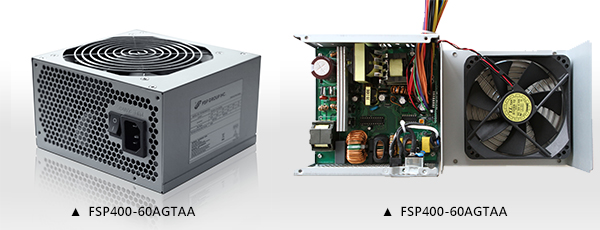Oh So Efficient: FSP Announces 400 W 80 Plus Titanium PSU
FSP now has a 400 W 80 Plus Titanium PSU.
FSP, a Taiwanese manufacturer of power supplies, announced a new PSU that carries a relatively small power envelope of 400 W while boasting an 80 Plus Titanium rating.
As you may know, 80 Plus Titanium is the highest efficiency rating in the 80 Plus certification system, making this quite an achievement. At this efficiency rating, PSUs need to manage 90 percent efficiency at 10 percent load, 94 percent at 50 percent, and 90 again at 10 percent. For use on the 230 V grid, this even jumps to 96 percent at 50 percent load. FSP claims that its unit is up to 94.18 percent efficient on the 115 V grid.
Considering that PSUs are generally most efficient at about 50 percent load, a 400 W unit is likely to be very well suited for many of today's systems, ranging from more powerful office PCs to light gaming systems. This is because those systems will operate around a 200 W load level more often than more powerful gaming or production systems may. The fact that a PSU is most efficient at half-load is also the reason why buying a PSU with a much higher wattage than necessary will almost never be optimally efficient.
For many manufacturers, FSP acts as an OEM, so there's a good chance that over the coming weeks you'll be seeing various other PSU vendors announcing 400 W 80-Plus Titanium PSUs, too. Those units often use the electronic design of FSP's PSUs but have a different casing, different fan, and different cables and connectors to add value. FSP also sells its PSUs directly to consumers, though.
This 400 W unit comes with a 120 mm fan (which you could argue isn't necessary anymore due to the low heat output thanks to the higher efficiency), a plain casing, and a non-modular cable design.
FSP did not announce pricing or availability.
Follow Niels Broekhuijsen @NBroekhuijsen. Follow us @tomshardware, on Facebook and on Google+.
Get Tom's Hardware's best news and in-depth reviews, straight to your inbox.
Niels Broekhuijsen is a Contributing Writer for Tom's Hardware US. He reviews cases, water cooling and pc builds.
-
Lmah I see this as potentially being one of the better PSU's for a HTPC, assuming it is of a high build quality. Hopefully some vendors opt for a silent variation.Reply -
none12345 Note, a large fan IS still necessary. Small or tiny fans just don't last. Big fans practically never go out.Reply
Id rather have a big fan, or no fan if doesn't need one. But definitely would not want a small fan in a PSU. -
Hydrotricithline ReplyNote, a large fan IS still necessary. Small or tiny fans just don't last. Big fans practically never go out.
Id rather have a big fan, or no fan if doesn't need one. But definitely would not want a small fan in a PSU.Note, a large fan IS still necessary. Small or tiny fans just don't last. Big fans practically never go out.
Id rather have a big fan, or no fan if doesn't need one. But definitely would not want a small fan in a PSU.
I have to completely agree on that, I'd much rather have a Low rpm large fan vs a small fan or even no fan, the db level of most low rpm large fans is almost silent, especially with a psu, probably isn't going to be your noisiest component in the system.
I'm looking forward to hopefully seeing more psu's like this coming in higher amperages aswell -
Onus I'd like to see these articles delayed until pricing and availability is known. Otherwise, however accurate they turn out to be, they're little more than fortune-telling.Reply
-
RedJaron Would like to know how many PCIe aux power cables this model comes with. Most 400W - 450W models I see don't include any power cables for the GPU even though they have the capacity to handle them. If this thing has two 6-pin cables, it'd be a top recommended unit for any budget builder.Reply -
InvalidError Reply
The problem with high-quality, high-efficiency low-wattage power supplies is that they cost nearly as much as very similar quality higher-power supplies with slightly lower efficiency. For a given price and quality, most people would probably pick a 650W Platinum (or even Gold) PSU over a 400W Titanium.14902119 said:It's about time!! Low wattage PSUs deserve some atention too.
Most of the time though, people putting together low-end builds simply pick 80+ basic/Bronze PSUs... or worse when they do not know better. -
RedJaron Reply
True enough. And that's not just for Plat and Titanium models. A good 80 Gold 400W - 450W unit is just as much as an 80 Bronze 550W that will not only meet your needs now, but also in future, more power demanding builds. And I don't think most people will care too much about the efficiency differences between Bronze and Gold.14903467 said:
The problem with high-quality, high-efficiency low-wattage power supplies is that they cost nearly as much as very similar quality higher-power supplies with slightly lower efficiency. For a given price and quality, most people would probably pick a 650W Platinum (or even Gold) PSU over a 400W Titanium.14902119 said:It's about time!! Low wattage PSUs deserve some atention too.
Most of the time though, people putting together low-end builds simply pick 80+ basic/Bronze PSUs... or worse when they do not know better. -
alextheblue ReplyIf this thing has two 6-pin cables, it'd be a top recommended unit for any budget builder.
As Invalid points out, these aren't really suited for budget builds. Super-high efficiency comes at a cost. A 450W FSP Aurum 92+ Platinum PSU costs around $100 - this Titanium unit would probably be at LEAST that expensive. A 450W FSP 80 Plus Silver PSU can be had for $60 or less. In a budget build $40-50 can make a big difference. Outside of FSP you can get also find good-quality 80 Plus Bronze or 80 Plus units for even less (or with higher output per dollar if your build necessitates it).
I see this as potentially being one of the better PSU's for a HTPC, assuming it is of a high build quality. Hopefully some vendors opt for a silent variation.
FSP builds some of the best quality units in the industry. They make PSUs for several major vendors too, so other brands often get the credit for FSP's excellent quality. At 400W with a Titanium efficiency rating and a large fan I would bet that it's already whisper quiet. It likely only produces audible noise levels at full load conditions - and by then the rest of your fans have also ratcheted up and are probably louder anyway.


